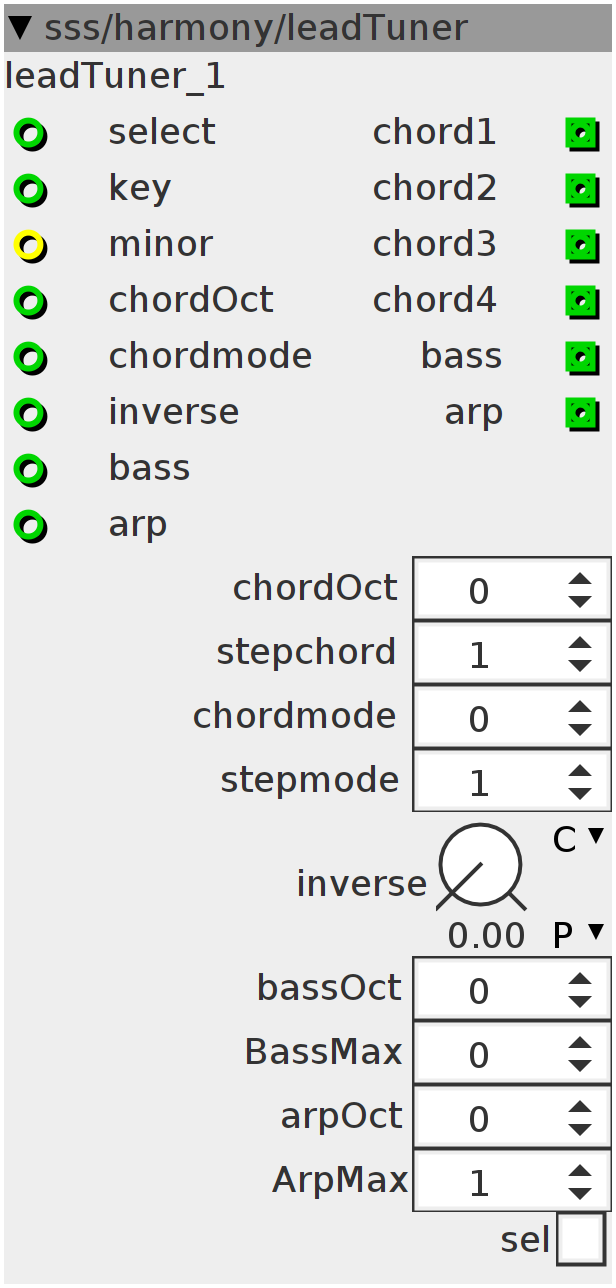leadTuner
Module to produce chord-progressions along side of the bass and melody. Bass and melody have their own inputs to select the arpeggio-note. Uses only notes for the selected chord and raises an octave when the arpeggio goes above 3, 7, 11 etc. Octaves are wrapped by the ArpMax and BassMax parameters. -key sets the key of the scale (major/minor scale) -when minor-input goes high, scale turns into minor -select sets the root note (selected from scaled notes) from where the chord is build up -chordOct offsets the chord in octaves -chordmode selects between 20 different chords, which are different combinations of the 7 available notes in the scale. -inverse is a bit-wise control of octave-offsets for the 4 notes of the chord, offsetting different combinations up to several octaves. Max is 511 different inverse operations
Inlets
int32 select
int32 key
int32 chordOct
int32 chordmode
int32 inverse
int32 bass
int32 arp
bool32 minor
Outlets
int32 chord1
int32 chord2
int32 chord3
int32 chord4
int32 bass
int32 arp
Parameters
int32 chordOct
int32 stepchord
int32 chordmode
int32 stepmode
int32 bassOct
int32 BassMax
int32 arpOct
int32 ArpMax
frac32.u.map inverse
bool32.tgl sel
int note[14] = {0, 2, 4, 5, 7, 9, 11, 0, 2, 3, 5, 7, 8, 10};
int i;
int nt[8];
int32_t select[4];
int offset[60] = {2, 4, 6, 2, 4, 5, 1, 3, 6, 2, 3, 6, 2, 3, 5, 3, 4, 6, 1, 3,
5, 1, 4, 6, 1, 3, 4, 1, 4, 5, 1, 2, 5, 1, 2, 4, 1, 5, 6, 2,
5, 6, 2, 3, 4, 1, 2, 3, 3, 4, 5, 3, 5, 6, 4, 5, 6, 1, 2, 6};int chordmode = (param_chordmode + inlet_chordmode) * param_stepmode;
chordmode = chordmode - (chordmode / 20) * 20;
select[0] = (inlet_select * param_stepchord + (inlet_select >> 2));
select[1] = (inlet_select * param_stepchord + (inlet_select >> 2)) +
offset[chordmode * 3];
select[2] = (inlet_select * param_stepchord + (inlet_select >> 2)) +
offset[chordmode * 3 + 1];
select[3] = (inlet_select * param_stepchord + (inlet_select >> 2)) +
offset[chordmode * 3 + 2];
for (i = 0; i < 4; i++) {
select[i] = select[i] - (select[i] / 7) * 7;
nt[i] = note[select[i] + inlet_minor * 7] - inlet_minor * 3;
}
int32_t inverse = (inlet_inverse + (param_inverse >> 19));
nt[0] = nt[0] + (inverse & 1 ? 12 : 0);
nt[1] = nt[1] + (inverse & 3 ? 12 : 0);
nt[2] = nt[2] + (inverse & 7 ? 12 : 0);
nt[3] = nt[3] + (inverse & 15 ? 12 : 0);
nt[0] = nt[0] + (inverse & 31 ? +24 : 0);
nt[1] = nt[1] + (inverse & 63 ? +24 : 0);
nt[2] = nt[2] + (inverse & 127 ? +24 : 0);
nt[3] = nt[3] + (inverse & 255 ? +24 : 0);
int key = inlet_key * 7 - (inlet_key * 7 / 12) * 12;
key = key > 0 ? key : key + 12;
int ns = nt[0];
ns = ns - (ns / 12) * 12;
ns = ns > 0 ? ns : ns + 12;
int arp = inlet_arp + select[0];
arp = arp > 0 ? arp : -arp;
int arpOct = arp / 7;
arp = arp - arpOct * 7;
arpOct = arpOct - (arpOct / param_ArpMax) * param_ArpMax;
int bass = inlet_bass / 12;
bass = bass - (bass / param_BassMax) * param_BassMax;
bass = bass > 0 ? bass : bass + param_BassMax;
bass += param_bassOct;
int chordoctave = (inlet_chordOct + param_chordOct) * 12 + key;
outlet_chord1 = nt[0] + chordoctave;
outlet_chord2 = nt[1] + chordoctave;
outlet_chord3 = nt[2] + chordoctave;
outlet_chord4 = nt[3] + chordoctave;
int br = nt[(inlet_bass + select[0]) & 3] -
(nt[(inlet_bass + select[0]) & 3] / 12) * 12;
br = br > 0 ? br : br + 12;
outlet_bass = br + key + bass * 12;
if (param_sel) {
outlet_arp = note[arp + inlet_minor * 7] + (arpOct + param_arpOct) * 12 +
key - inlet_minor * 3;
} else {
int nr = nt[arp & 3] - (nt[arp & 3] / 12) * 12;
nr = nr > 0 ? nr : nr + 12;
outlet_arp = nr + (arpOct + param_arpOct) * 12 + key;
}